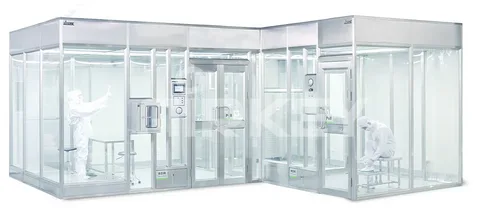Designing controlled environments demands more than airtight walls and high-grade filtration. Behind the panels and partitions lies the support structure that determines how reliably a cleanroom will perform for decades. Modular aluminum framing systems have gained attention in this field, not only for their flexibility but for the way they address hidden challenges that many industries overlook.
Uniform Framing Geometry Supporting Consistent Cleanroom Performance
Consistency is the cornerstone of cleanroom function, and the framing geometry plays a larger role than many realize. A modular aluminum framing system provides a repeatable and uniform framework, allowing panels and seals to fit tightly across the entire structure. This uniformity reduces variations that might otherwise create weak points where airborne particles could bypass filtration measures.
Engineers also value the predictability of standardized profiles. The precision inherent in a MiniTec extruded aluminum framing solution helps maintain even airflow distribution and supports mechanical systems that must align perfectly across large spans. Cleanroom performance depends on minimizing disruptions in airflow patterns, and uniform geometry ensures repeatable results every time.
Lightweight Profiles Reducing Structural Load in Controlled Environments
Cleanrooms are often added to existing buildings where floor loading becomes a concern. Lightweight aluminum profiles reduce the strain on existing foundations while still providing the rigidity required for structural stability. Compared to heavier alternatives like steel, these systems offer a higher strength-to-weight ratio that supports large-scale installations without unnecessary weight.
Using a MiniTec aluminum frame kit provides both durability and reduced mass, which is critical in facilities that expand vertically or retrofit older structures. The lighter load also reduces stress on overhead systems, such as HVAC or filtration ducts, ensuring that cleanroom performance remains consistent without hidden strain on the host building.
Dimensional Accuracy Sustaining Alignment of Cleanroom Panels and Partitions
A cleanroom’s barrier system only performs as intended if the panels align perfectly. Dimensional accuracy is a defining quality of modular aluminum framing systems, ensuring that every panel, partition, and seal locks into place with tight tolerances. This prevents the misalignment that can lead to small but impactful leaks.
High accuracy also benefits future modifications. If new equipment or partitions need to be added, the precision of MiniTec aluminum framing material ensures compatibility without cutting or reshaping components. The result is a stable and reliable system that protects both current and future operations from costly misalignments.
Non-porous Finishes Limiting Microbial Retention on Framing Surfaces
Cleanroom environments cannot tolerate surfaces that harbor contaminants. The non-porous finish applied to modular aluminum framing creates a smooth and cleanable surface that resists microbial retention. Unlike porous materials, aluminum profiles do not absorb cleaning agents, which means residues and biofilms cannot form easily.
This quality supports regular cleaning protocols required in pharmaceutical, semiconductor, and medical industries. A MiniTec Aluminum Framing structure ensures that hygiene standards are consistently met, reducing risks of contamination. Surfaces can be wiped down quickly, making maintenance less disruptive and more effective.
Compatibility with Cleanroom Enclosures and Glazing Systems
Cleanrooms often require transparent partitions, observation windows, or specialized enclosures. Modular aluminum framing systems integrate seamlessly with glazing systems, allowing clear sightlines without compromising performance. This compatibility allows facilities to build spaces that balance visibility with containment.
The strength of MiniTec aluminum framing material supports large panels of glass or polycarbonate while maintaining alignment with the surrounding enclosure. This flexibility allows engineers to design custom layouts that serve both functional and safety requirements without needing complex reinforcements.
Reduced Assembly Debris Improving Initial Cleanliness Validation
One overlooked factor in cleanroom construction is the debris produced during installation. Systems that generate sawdust, filings, or particulate waste compromise the cleanroom’s initial validation. Modular aluminum framing reduces this risk because the components are prefabricated with clean cuts and require minimal on-site modification.
The fewer particles introduced during assembly, the easier it is for the facility to pass validation testing. Using a MiniTec aluminum frame kit ensures smooth edges and tight fittings, which not only reduces cleanup time but also lowers the risk of lingering debris affecting sensitive operations.
Interchangeable Connectors Ensuring Long Term Design Continuity
Cleanrooms often evolve as processes change, requiring expansions, upgrades, or reconfiguration. Interchangeable connectors in modular aluminum framing systems allow structures to adapt without replacing the entire framework. This interchangeability ensures long-term continuity, supporting sustainable investment in infrastructure.
Facilities that rely on MiniTec extruded aluminum framing benefit from a catalog of connectors designed to integrate seamlessly with existing profiles. The ability to modify layouts without disruption makes long-term planning simpler and more cost-effective, reducing the risk of obsolescence.
Streamlined Installation Lowering Overall Project Lead Times
Time-to-operation matters in industries where downtime equals significant revenue loss. Modular aluminum framing systems reduce installation time by providing standardized components that fit together without specialized fabrication. This streamlines project timelines and allows businesses to begin production faster.
Contractors appreciate the efficiency of MiniTec aluminum framing material, which reduces both labor hours and potential for installation errors. Shorter build times mean less exposure to environmental contamination during construction and quicker transitions from assembly to validation testing. For cleanrooms, where compliance timelines are strict, faster installation can make all the difference.



